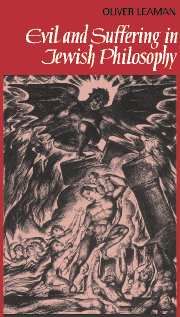1 - Job
Published online by Cambridge University Press: 24 October 2009
Summary
Much of the Jewish Bible is concerned with evil and suffering, but perhaps the area in which the most concentrated discussion of these topics arises is in the Book of Job. There has been a great deal of argument over the exact origins of the text, its relationship to Babylonian folk-tales and the nature of its structure, and there can be no doubt that the Book of Job is a very attractive and accessible piece of literary construction. It consists initially of a dialogue between Job, his three friends Eliphaz, Bildad and Zophar, and God. Job is a righteous individual who in the past enjoyed good health, wealth and a high reputation. Suddenly, for no apparent reason, everything goes wrong. He loses his money, his children die, he is wracked with illness and misfortune, and quite understandably wonders why things have turned out so poorly for him. After all, he was an upright individual in the past and feels that he does not deserve such rough treatment in the present. This is very much the theme of the text, and Job's friends do not help much in the way of providing arguments which explain how to reconcile Job's sufferings with a notion of moral balance in the world.
Eliphaz informs the miserable Job that the righteous do not finally lose their material wealth in this life while the evil do not in the end gain materially in their temporal existence. He also suggests that no one really suffers for no reason, and implies that Job must have done something iniquitous in the past to account for his present troubles.
- Type
- Chapter
- Information
- Evil and Suffering in Jewish Philosophy , pp. 19 - 32Publisher: Cambridge University PressPrint publication year: 1995



